Fleurs du Mal Magazine


Or see the index
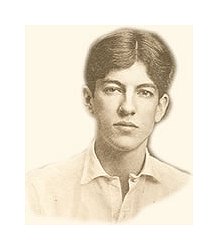
Alan Seeger
(1888-1916)
Sonnet IX
Amid the florid multitude her face
Was like the full moon seen behind the lace
Of orchard boughs where clouded blossoms part
When Spring shines in the world and in the heart.
As the full-moon-beams to the ferny floor
Of summer woods through flower and foliage pour,
So to my being’s innermost recess
Flooded the light of so much loveliness;
She held as in a vase of priceless ware
The wine that over arid ways and bare
My youth was the pathetic thirsting for,
And where she moved the veil of Nature grew
Diaphanous and that radiance mantled through
Which, when I see, I tremble and adore.
Alan Seeger poetry
fleursdumal.nl magazine
More in: Archive S-T, Seeger, Alan
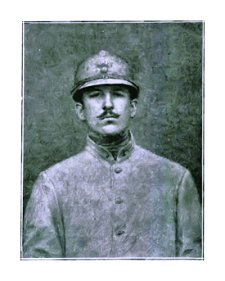
Alan Seeger
(1888-1916)
The Deserted Garden
I know a village in a far-off land
Where from a sunny, mountain-girdled plain
With tinted walls a space on either hand
And fed by many an olive-darkened lane
The high-road mounts, and thence a silver band
Through vineyard slopes above and rolling grain,
Winds off to that dim corner of the skies
Where behind sunset hills a stately city lies.
Here, among trees whose overhanging shade
Strews petals on the little droves below,
Pattering townward in the morning weighed
With greens from many an upland garden-row,
Runs an old wall; long centuries have frayed
Its scalloped edge, and passers to and fro
Heard never from beyond its crumbling height
Sweet laughter ring at noon or plaintive song at night.
But here where little lizards bask and blink
The tendrils of the trumpet-vine have run,
At whose red bells the humming bird to drink
Stops oft before his garden feast is done;
And rose-geraniums, with that tender pink
That cloud-banks borrow from the setting sun,
Have covered part of this old wall, entwined
With fair plumbago, blue as evening heavens behind.
And crowning other parts the wild white rose
Rivals the honey-suckle with the bees.
Above the old abandoned orchard shows
And all within beneath the dense-set trees,
Tall and luxuriant the rank grass grows,
That settled in its wavy depth one sees
Grass melt in leaves, the mossy trunks between,
Down fading avenues of implicated green;
Wherein no lack of flowers the verdurous night
With stars and pearly nebula o’erlay;
Azalea-boughs half rosy and half white
Shine through the green and clustering apple-spray,
Such as the fairy-queen before her knight
Waved in old story, luring him away
Where round lost isles Hesperian billows break
Or towers loom up beneath the clear, translucent lake;
And under the deep grass blue hare-bells hide,
And myrtle plots with dew-fall ever wet,
Gay tiger-lilies flammulate and pied,
Sometime on pathway borders neatly set,
Now blossom through the brake on either side,
Where heliotrope and weedy mignonette,
With vines in bloom and flower-bearing trees,
Mingle their incense all to swell the perfumed breeze,
That sprung like Hermes from his natal cave
In some blue rampart of the curving West,
Comes up the valleys where green cornfields wave,
Ravels the cloud about the mountain crest,
Breathes on the lake till gentle ripples pave
Its placid floor; at length a long-loved guest,
He steals across this plot of pleasant ground,
Waking the vocal leaves to a sweet vernal sound.
Here many a day right gladly have I sped,
Content amid the wavy plumes to lie,
And through the woven branches overhead
Watch the white, ever-wandering clouds go by,
And soaring birds make their dissolving bed
Far in the azure depths of summer sky,
Or nearer that small huntsman of the air,
The fly-catcher, dart nimbly from his leafy lair;
Pillowed at ease to hear the merry tune
Of mating warblers in the boughs above
And shrill cicadas whom the hottest noon
Keeps not from drowsy song; the mourning dove
Pours down the murmuring grove his plaintive croon
That like the voice of visionary love
Oft have I risen to seek through this green maze
(Even as my feet thread now the great world’s garden-ways);
And, parting tangled bushes as I passed
Down beechen alleys beautiful and dim,
Perhaps by some deep-shaded pool at last
My feet would pause, where goldfish poise and swim,
And snowy callas’ velvet cups are massed
Around the mossy, fern-encircled brim.
Here, then, that magic summoning would cease,
Or sound far off again among the orchard trees.
And here where the blanched lilies of the vale
And violets and yellow star-flowers teem,
And pink and purple hyacinths exhale
Their heavy fume, once more to drowse and dream
My head would sink, from many an olden tale
Drawing imagination’s fervid theme,
Or haply peopling this enchanting spot
Only with fair creations of fantastic thought.
For oft I think, in years long since gone by,
That gentle hearts dwelt here and gentle hands
Stored all this bowery bliss to beautify
The paradise of some unsung romance;
Here, safe from all except the loved one’s eye,
‘Tis sweet to think white limbs were wont to glance,
Well pleased to wanton like the flowers and share
Their simple loveliness with the enamored air.
Thrice dear to them whose votive fingers decked
The altars of First Love were these green ways, —
These lawns and verdurous brakes forever flecked
With the warm sunshine of midsummer days;
Oft where the long straight allies intersect
And marble seats surround the open space,
Where a tiled pool and sculptured fountain stand,
Hath Evening found them seated, silent, hand in hand.
When twilight deepened, in the gathering shade
Beneath that old titanic cypress row,
Whose sombre vault and towering colonnade
Dwarfed the enfolded forms that moved below,
Oft with close steps these happy lovers strayed,
Till down its darkening aisle the sunset glow
Grew less and patterning the garden floor
Faint flakes of filtering moonlight mantled more and more.
And the strange tempest that a touch imparts
Through the mid fibre of the molten frame,
When the sweet flesh in early youth asserts
Its heyday verve and little hints enflame,
Disturbed them as they walked; from their full hearts
Welled the soft word, and many a tender name
Strove on their lips as breast to breast they strained
And the deep joy they drank seemed never, never drained.
Love’s soul that is the depth of starry skies
Set in the splendor of one upturned face
To beam adorably through half-closed eyes;
Love’s body where the breadth of summer days
And all the beauty earth and air comprise
Come to the compass of an arm’s embrace,
To burn a moment on impassioned lips
And yield intemperate joy to quivering finger-tips,
They knew; and here where morning-glories cling
Round carven forms of carefullest artifice,
They made a bower where every outward thing
Should comment on the cause of their own bliss;
With flowers of liveliest hue encompassing
That flower that the beloved body is —
That rose that for the banquet of Love’s bee
Has budded all the aeons of past eternity.
But their choice seat was where the garden wall,
Crowning a little summit, far and near,
Looks over tufted treetops onto all
The pleasant outer country; rising here
From rustling foliage where cuckoos call
On summer evenings, stands a belvedere,
Buff-hued, of antique plaster, overrun
With flowering vines and weatherworn by rain and sun.
Still round the turrets of this antique tower
The bougainvillea hangs a crimson crown,
Wistaria-vines and clematis in flower,
Wreathing the lower surface further down,
Hide the old plaster in a very shower
Of motley blossoms like a broidered gown.
Outside, ascending from the garden grove,
A crumbling stairway winds to the one room above.
And whoso mounts by this dismantled stair
Finds the old pleasure-hall, long disarrayed,
Brick-tiled and raftered, and the walls foursquare
Ringed all about with a twofold arcade.
Backward dense branches intercept the glare
Of afternoon with eucalyptus shade;
Eastward the level valley-plains expand,
Sweet as a queen’s survey of her own Fairyland.
For through that frame the ivied arches make,
Wide tracts of sunny midland charm the eye,
Frequent with hamlet, grove, and lucent lake
Where the blue hills’ inverted contours lie;
Far to the east where billowy mountains break
In surf of snow against a sapphire sky,
Huge thunderheads loom up behind the ranges,
Changing from gold to pink as deepening sunset changes;
And over plain and far sierra spread
The fulgent rays of fading afternoon,
Showing each utmost peak and watershed
All clarified, each tassel and festoon
Of floating cloud embroidered overhead,
Like lotus-leaves on bluest waters strewn,
Flushing with rose, while all breathes fresh and free
In peace and amplitude and bland tranquillity.
Dear were such evenings to this gentle pair;
Love’s tide that launched on with a blast too strong
Sweeps toward the foaming reef, the hidden snare,
Baffling with fond illusion’s siren-song,
Too faint, on idle shoals, to linger there
Far from Youth’s glowing dream, bore them along,
With purple sail and steered by seraph hands
To isles resplendent in the sunset of romance.
And out of this old house a flowery fane,
A bridal bower, a pearly pleasure-dome,
They built, and furnished it with gold and grain,
And bade all spirits of beauty hither come,
And winged Love to enter with his train
And bless their pillow, and in this his home
Make them his priests as Hero was of yore
In her sweet girlhood by the blue Dardanian shore.
Tree-ferns, therefore, and potted palms they brought,
Tripods and urns in rare and curious taste,
Polychrome chests and cabinets inwrought
With pearl and ivory etched and interlaced;
Pendant brocades with massive braid were caught,
And chain-slung, oriental lamps so placed
To light the lounger on some low divan,
Sunken in swelling down and silks from Hindustan.
And there was spread, upon the ample floors,
Work of the Levantine’s laborious loom,
Such as by Euxine or Ionian shores
Carpets the dim seraglio’s scented gloom.
Each morn renewed, the garden’s flowery stores
Blushed in fair vases, ochre and peach-bloom,
And little birds through wicker doors left wide
Flew in to trill a space from the green world outside.
And there was many a dainty attitude,
Bronze and eburnean. All but disarrayed,
Here in eternal doubt sweet Psyche stood
Fain of the bath’s delight, yet still afraid
Lest aught in that palatial solitude
Lurked of most menace to a helpless maid.
Therefore forever faltering she stands,
Nor yet the last loose fold slips rippling from her hands.
Close by upon a beryl column, clad
In the fresh flower of adolescent grace,
They set the dear Bithynian shepherd lad,
The nude Antinous. That gentle face,
Forever beautiful, forever sad,
Shows but one aspect, moon-like, to our gaze,
Yet Fancy pictures how those lips could smile
At revelries in Rome, and banquets on the Nile.
And there were shapes of Beauty myriads more,
Clustering their rosy bridal bed around,
Whose scented breadth a silken fabric wore
Broidered with peacock hues on creamiest ground,
Fit to have graced the barge that Cydnus bore
Or Venus’ bed in her enchanted mound,
While pillows swelled in stuffs of Orient dyes,
All broidered with strange fruits and birds of Paradise.
‘Twas such a bower as Youth has visions of,
Thither with one fair spirit to retire,
Lie upon rose-leaves, sleep and wake with Love
And feast on kisses to the heart’s desire;
Where by a casement opening on a grove,
Wide to the wood-winds and the sweet birds’ choir,
A girl might stand and gaze into green boughs,
Like Credhe at the window of her golden house.
Or most like Vivien, the enchanting fay,
Where with her friend, in the strange tower they planned,
She lies and dreams eternity away,
Above the treetops in Broceliande,
Sometimes at twilight when the woods are gray
And wolf-packs howl far out across the lande,
Waking to love, while up behind the trees
The large midsummer moon lifts–even so loved these.
For here, their pleasure was to come and sit
Oft when the sun sloped midway to the west,
Watching with sweet enjoyment interknit
The long light slant across the green earth’s breast,
And clouds upon the ranges opposite,
Rolled up into a gleaming thundercrest,
Topple and break and fall in purple rain,
And mist of summer showers trail out across the plain.
Whereon the shafts of ardent light, far-flung
Across the luminous azure overhead,
Ofttimes in arcs of transient beauty hung
The fragmentary rainbow’s green and red.
Joy it was here to love and to be young,
To watch the sun sink to his western bed,
And streaming back out of their flaming core
The vesperal aurora’s glorious banners soar.
Tinging each altitude of heaven in turn,
Those fiery rays would sweep. The cumuli
That peeped above the mountain-tops would burn
Carmine a space; the cirrus-whorls on high,
More delicate than sprays of maiden fern,
Streak with pale rose the peacock-breasted sky,
Then blanch. As water-lilies fold at night,
Sank back into themselves those plumes of fervid light.
And they would watch the first faint stars appear,
The blue East blend with the blue hills below,
As lovers when their shuddering bliss draws near
Into one pulse of fluid rapture grow.
New fragrance on the freshening atmosphere
Would steal with evening, and the sunset glow
Draw deeper down into the wondrous west
Round vales of Proserpine and islands of the blest.
So dusk would come and mingle lake and shore,
The snow-peaks fade to frosty opaline,
To pearl the domed clouds the mountains bore,
Where late the sun’s effulgent fire had been —
Showing as darkness deepened more and more
The incandescent lightnings flare within,
And Night that furls the lily in the glen
And twines impatient arms would fall, and then–and then . . .
Sometimes the peasant, coming late from town
With empty panniers on his little drove
Past the old lookout when the Northern Crown
Glittered with Cygnus through the scented grove,
Would hear soft noise of lute-strings wafted down
And voices singing through the leaves above
Those songs that well from the warm heart that woos
At balconies in Merida or Vera Cruz.
And he would pause under the garden wall,
Caught in the spell of that voluptuous strain,
With all the sultry South in it, and all
Its importunity of love and pain;
And he would wait till the last passionate fall
Died on the night, and all was still again, —
Then to his upland village wander home,
Marvelling whence that flood of elfin song might come.
O lyre that Love’s white holy hands caress,
Youth, from thy bosom welled their passionate lays —
Sweet opportunity for happiness
So brief, so passing beautiful–O days,
When to the heart’s divine indulgences
All earth in smiling ministration pays —
Thine was the source whose plenitude, past over,
What prize shall rest to pluck, what secret to discover!
The wake of color that follows her when May
Walks on the hills loose-haired and daisy-crowned,
The deep horizons of a summer’s day,
Fair cities, and the pleasures that abound
Where music calls, and crowds in bright array
Gather by night to find and to be found;
What were these worth or all delightful things
Without thine eyes to read their true interpretings!
For thee the mountains open glorious gates,
To thee white arms put out from orient skies,
Earth, like a jewelled bride for one she waits,
Decks but to be delicious in thine eyes,
Thou guest of honor for one day, whose fetes
Eternity has travailed to devise;
Ah, grace them well in the brief hour they last!
Another’s turn prepares, another follows fast.
Yet not without one fond memorial
Let my sun set who found the world so fair!
Frail verse, when Time the singer’s coronal
Has rent, and stripped the rose-leaves from his hair,
Be thou my tablet on the temple wall!
Among the pious testimonials there,
Witness how sweetly on my heart as well
The miracles of dawn and starry evening fell!
Speak of one then who had the lust to feel,
And, from the hues that far horizons take,
And cloud and sunset, drank the wild appeal,
Too deep to live for aught but life’s sweet sake,
Whose only motive was the will to kneel
Where Beauty’s purest benediction spake,
Who only coveted what grove and field
And sunshine and green Earth and tender arms could yield —
A nympholept, through pleasant days and drear
Seeking his faultless adolescent dream,
A pilgrim down the paths that disappear
In mist and rainbows on the world’s extreme,
A helpless voyager who all too near
The mouth of Life’s fair flower-bordered stream,
Clutched at Love’s single respite in his need
More than the drowning swimmer clutches at a reed —
That coming one whose feet in other days
Shall bleed like mine for ever having, more
Than any purpose, felt the need to praise
And seek the angelic image to adore,
In love with Love, its wonderful, sweet ways
Counting what most makes life worth living for,
That so some relic may be his to see
How I loved these things too and they were dear to me.
I sometimes think a conscious happiness
Mantles through all the rose’s sentient vine
When summer winds with myriad calyces
Of bloom its clambering height incarnadine;
I sometimes think that cleaving lips, no less,
And limbs that crowned desires at length entwine
Are nerves through which that being drinks delight,
Whose frame is the green Earth robed round with day and night.
And such were theirs: the traveller without,
Pausing at night under the orchard trees,
Wondered and crossed himself in holy doubt,
For through their song and in the murmuring breeze
It seemed angelic choirs were all about
Mingling in universal harmonies,
As though, responsive to the chords they woke,
All Nature into sweet epithalamium broke.
And still they think a spirit haunts the place:
‘Tis said, when Night has drawn her jewelled pall
And through the branches twinkling fireflies trace
Their mimic constellations, if it fall
That one should see the moon rise through the lace
Of blossomy boughs above the garden wall,
That surely would he take great ill thereof
And famish in a fit of unexpressive love.
But this I know not, for what time the wain
Was loosened and the lily’s petal furled,
Then I would rise, climb the old wall again,
And pausing look forth on the sundown world,
Scan the wide reaches of the wondrous plain,
The hamlet sites where settling smoke lay curled,
The poplar-bordered roads, and far away
Fair snowpeaks colored with the sun’s last ray.
Waves of faint sound would pulsate from afar —
Faint song and preludes of the summer night;
Deep in the cloudless west the evening star
Hung ‘twixt the orange and the emerald light;
From the dark vale where shades crepuscular
Dimmed the old grove-girt belfry glimmering white,
Throbbing, as gentlest breezes rose or fell,
Came the sweet invocation of the evening bell.
Alan Seeger poetry
fleursdumal.nl magazine
More in: Archive S-T, Seeger, Alan, WAR & PEACE
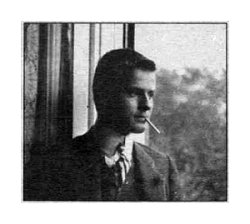
Hans Leybold
(1892-1914)
Auf einer Feldpostkarte
Zerflossen alles
in wirren Schaum,
mein Hirn ein weiter
luftleerer Raum.
Von außen schlagen
die Hämmer drauf:
mein Schädel ist
ein Kirchturmknauf.
Hans Leybold poetry
fleursdumal.nl magazine
More in: *War Poetry Archive, Archive K-L, Hans Leybold, Leybold, Hans
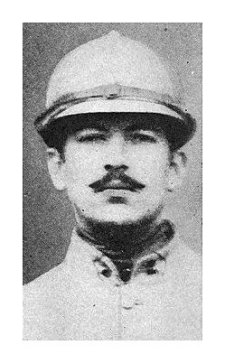
Alan Seeger
(1888-1916)
I Have a Rendezvous with Death . . .
I have a rendezvous with Death
At some disputed barricade,
When Spring comes back with rustling shade
And apple-blossoms fill the air —
I have a rendezvous with Death
When Spring brings back blue days and fair.
It may be he shall take my hand
And lead me into his dark land
And close my eyes and quench my breath —
It may be I shall pass him still.
I have a rendezvous with Death
On some scarred slope of battered hill,
When Spring comes round again this year
And the first meadow-flowers appear.
God knows ’twere better to be deep
Pillowed in silk and scented down,
Where Love throbs out in blissful sleep,
Pulse nigh to pulse, and breath to breath,
Where hushed awakenings are dear . . .
But I’ve a rendezvous with Death
At midnight in some flaming town,
When Spring trips north again this year,
And I to my pledged word am true,
I shall not fail that rendezvous.
Alan Seeger poetry
fleursdumal.nl magazine
More in: Archive S-T, Seeger, Alan

Alan Seeger
(1888-1916)
The Need to Love
The need to love that all the stars obey
Entered my heart and banished all beside.
Bare were the gardens where I used to stray;
Faded the flowers that one time satisfied.
Before the beauty of the west on fire,
The moonlit hills from cloister-casements viewed,
Cloud-like arose the image of desire,
And cast out peace and maddened solitude.
I sought the City and the hopes it held:
With smoke and brooding vapors intercurled,
As the thick roofs and walls close-paralleled
Shut out the fair horizons of the world —
A truant from the fields and rustic joy,
In my changed thought that image even so
Shut out the gods I worshipped as a boy
And all the pure delights I used to know.
Often the veil has trembled at some tide
Of lovely reminiscence and revealed
How much of beauty Nature holds beside
Sweet lips that sacrifice and arms that yield:
Clouds, window-framed, beyond the huddled eaves
When summer cumulates their golden chains,
Or from the parks the smell of burning leaves,
Fragrant of childhood in the country lanes,
An organ-grinder’s melancholy tune
In rainy streets, or from an attic sill
The blue skies of a windy afternoon
Where our kites climbed once from some grassy hill:
And my soul once more would be wrapped entire
In the pure peace and blessing of those years
Before the fierce infection of Desire
Had ravaged all the flesh. Through starting tears
Shone that lost Paradise; but, if it did,
Again ere long the prison-shades would fall
That Youth condemns itself to walk amid,
So narrow, but so beautiful withal.
And I have followed Fame with less devotion,
And kept no real ambition but to see
Rise from the foam of Nature’s sunlit ocean
My dream of palpable divinity;
And aught the world contends for to mine eye
Seemed not so real a meaning of success
As only once to clasp before I die
My vision of embodied happiness.
Alan Seeger poetry
fleursdumal.nl magazine
More in: Archive S-T, Seeger, Alan
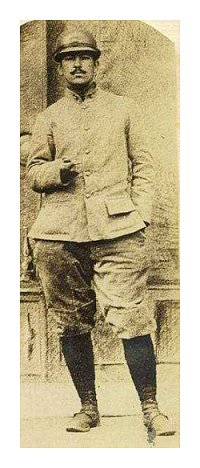
Alan Seeger
(1888-1916)
Ode in Memory of the American Volunteers Fallen for France
I
Ay, it is fitting on this holiday,
Commemorative of our soldier dead,
When–with sweet flowers of our New England May
Hiding the lichened stones by fifty years made gray —
Their graves in every town are garlanded,
That pious tribute should be given too
To our intrepid few
Obscurely fallen here beyond the seas.
Those to preserve their country’s greatness died;
But by the death of these
Something that we can look upon with pride
Has been achieved, nor wholly unreplied
Can sneerers triumph in the charge they make
That from a war where Freedom was at stake
America withheld and, daunted, stood aside.
II
Be they remembered here with each reviving spring,
Not only that in May, when life is loveliest,
Around Neuville-Saint-Vaast and the disputed crest
Of Vimy, they, superb, unfaltering,
In that fine onslaught that no fire could halt,
Parted impetuous to their first assault;
But that they brought fresh hearts and springlike too
To that high mission, and ’tis meet to strew
With twigs of lilac and spring’s earliest rose
The cenotaph of those
Who in the cause that history most endears
Fell in the sunny morn and flower of their young years.
III
Yet sought they neither recompense nor praise,
Nor to be mentioned in another breath
Than their blue coated comrades whose great days
It was their pride to share–ay, share even to the death!
Nay, rather, France, to you they rendered thanks
(Seeing they came for honor, not for gain),
Who, opening to them your glorious ranks,
Gave them that grand occasion to excel,
That chance to live the life most free from stain
And that rare privilege of dying well.
IV
O friends! I know not since that war began
From which no people nobly stands aloof
If in all moments we have given proof
Of virtues that were thought American.
I know not if in all things done and said
All has been well and good,
Or if each one of us can hold his head
As proudly as he should,
Or, from the pattern of those mighty dead
Whose shades our country venerates to-day,
If we’ve not somewhat fallen and somewhat gone astray.
But you to whom our land’s good name is dear,
If there be any here
Who wonder if her manhood be decreased,
Relaxed its sinews and its blood less red
Than that at Shiloh and Antietam shed,
Be proud of these, have joy in this at least,
And cry: “Now heaven be praised
That in that hour that most imperilled her,
Menaced her liberty who foremost raised
Europe’s bright flag of freedom, some there were
Who, not unmindful of the antique debt,
Came back the generous path of Lafayette;
And when of a most formidable foe
She checked each onset, arduous to stem —
Foiled and frustrated them —
On those red fields where blow with furious blow
Was countered, whether the gigantic fray
Rolled by the Meuse or at the Bois Sabot,
Accents of ours were in the fierce melee;
And on those furthest rims of hallowed ground
Where the forlorn, the gallant charge expires,
When the slain bugler has long ceased to sound,
And on the tangled wires
The last wild rally staggers, crumbles, stops,
Withered beneath the shrapnel’s iron showers: —
Now heaven be thanked, we gave a few brave drops;
Now heaven be thanked, a few brave drops were ours.”
V
There, holding still, in frozen steadfastness,
Their bayonets toward the beckoning frontiers,
They lie–our comrades–lie among their peers,
Clad in the glory of fallen warriors,
Grim clusters under thorny trellises,
Dry, furthest foam upon disastrous shores,
Leaves that made last year beautiful, still strewn
Even as they fell, unchanged, beneath the changing moon;
And earth in her divine indifference
Rolls on, and many paltry things and mean
Prate to be heard and caper to be seen.
But they are silent, calm; their eloquence
Is that incomparable attitude;
No human presences their witness are,
But summer clouds and sunset crimson-hued,
And showers and night winds and the northern star.
Nay, even our salutations seem profane,
Opposed to their Elysian quietude;
Our salutations calling from afar,
From our ignobler plane
And undistinction of our lesser parts:
Hail, brothers, and farewell; you are twice blest, brave hearts.
Double your glory is who perished thus,
For you have died for France and vindicated us.
Alan Seeger: Ode in Memory of the American Volunteers Fallen for France
(To have been read before the statue of Lafayette and Washington in Paris, on Decoration Day, May 30, 1916.)
fleursdumal.nl magazine
More in: Archive S-T, Seeger, Alan
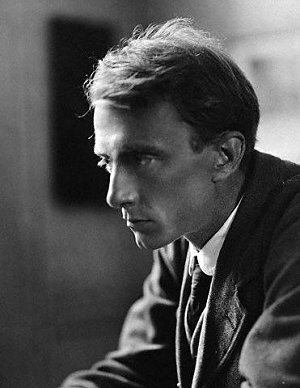
Edward Thomas
(1878–1917)
Like the Touch of Rain
Like the touch of rain she was
On a man’s flesh and hair and eyes
When the joy of walking thus
Has taken him by surprise:
With the love of the storm he burns,
He sings, he laughs, well I know how,
But forgets when he returns
As I shall not forget her ‘Go now’.
Those two words shut a door
Between me and the blessed rain
That was never shut before
And will not open again.
Edward Thomas poetry
fleursdumal.nl magazine
More in: Archive S-T, Thomas, Edward
![]()
Rupert Brooke
(1887-1915)
TIARE TAHITI
AMUA, when our laughter ends,
And hearts and bodies, brown as white,
Are dust about the doors of friends,
Or scent ablowing down the night,
Then, oh! then, the wise agree,
Comes our immortality.
Mamua, there waits a land
Hard for us to understand.
Out of time, beyond the sun,
All are one in Paradise,
You and Pupure are one,
And Taü, and the ungainly wise.
There the Eternals are, and there
The Good, the Lovely, and the True,
And Types, whose earthly copies were
The foolish broken things we knew;
There is the Face, whose ghosts we are;
The real, the never-setting Star;
And the Flower, of which we love
Faint and fading shadows here;
Never a tear, but only Grief;
Dance, but not the limbs that move;
Songs in Song shall disappear;
Instead of lovers, Love shall be;
For hearts, Immutability;
And there, on the Ideal Reef,
Thunders the Everlasting Sea!
And my laughter, and my pain,
Shall home to the Eternal Brain.
And all lovely things, they say,
Meet in Loveliness again;
Miri’s laugh, Teipo’s feet,
And the hands of Matua,
Stars and sunlight there shall meet
Coral’s hues and rainbows there,
And Teüra’s braided hair;
And with the starred tiare’s white,
And white birds in the dark ravine,
And flamboyants ablaze at night,
And jewels, and evening’s after-green,
And dawns of pearl and gold and red,
Mamua, your lovelier head!
And there’ll no more be one who dreams
Under the ferns, of crumbling stuff,
Eyes of illusion, mouth that seems,
All time-entangled human love.
And you’ll no longer swing and sway
Divinely down the scented shade,
Where feet to Ambulation fade,
And moons are lost in endless Day.
How shall we wind these wreaths of ours,
Where there are neither heads nor flowers?
Oh, Heaven’s Heaven! — but we’ll be missing
The palms, and sunlight, and the south;
And there’s an end, I think, of kissing,
When our mouths are one with Mouth …
Taü here, Mamua,
Crown the hair, and come away!
Hear the calling of the moon,
And the whispering scents that stray
About the idle warm lagoon.
Hasten, hand in human hand,
Down the dark, the flowered way,
Along the whiteness of the sand,
And in the water’s soft caress,
Wash the mind of foolishness,
Mamua, until the day.
Spend the glittering moonlight there
Pursuing down the soundless deep
Limbs that gleam and shadowy hair,
Or floating lazy, half-asleep.
Dive and double and follow after,
Snare in flowers, and kiss, and call,
With lips that fade, and human laughter
And faces individual,
Well this side of Paradise! …
There’s little comfort in the wise.
Source: Rupert Brooke. London: Sidgwick & Jackson, 1915
Rupert Brooke poetry
fleursdumal.nl magazine
More in: Archive A-B, Brooke, Rupert
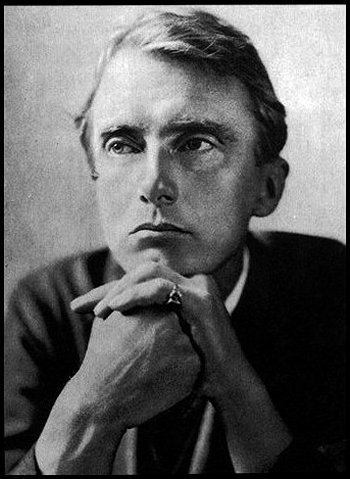
EDWARD THOMAS
(1878-1917)
O c t o b e r
The green elm with the one great bough of gold
Lets leaves into the grass slip, one by one, —
The short hill grass, the mushrooms small milk-white,
Harebell and scabious and tormentil,
That blackberry and gorse, in dew and sun,
Bow down to; and the wind travels too light
To shake the fallen birch leaves from the fern;
The gossamers wander at their own will.
At heavier steps than birds’ the squirrels scold.
The rich scene has grown fresh again and new
As Spring and to the touch is not more cool
Than it is warm to the gaze; and now I might
As happy be as earth is beautiful,
Were I some other or with earth could turn
In alternation of violet and rose,
Harebell and snowdrop, at their season due,
And gorse that has no time not to be gay.
But if this be not happiness, — who knows?
Some day I shall think this a happy day,
And this mood by the name of melancholy
Shall no more blackened and obscured be.
Edward Thomas: October
fleursdumal.nl magazine
More in: Archive S-T, Thomas, Edward
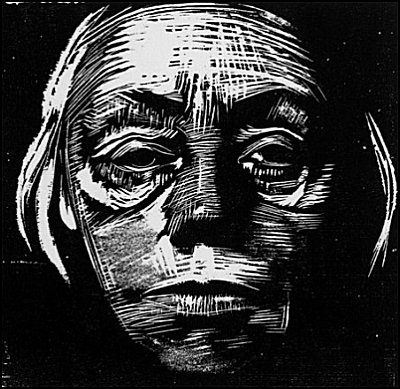
K ä t h e K o l l w i t z
D i e T o t e n m a h n e n u n s
( I I ) B i l d e r
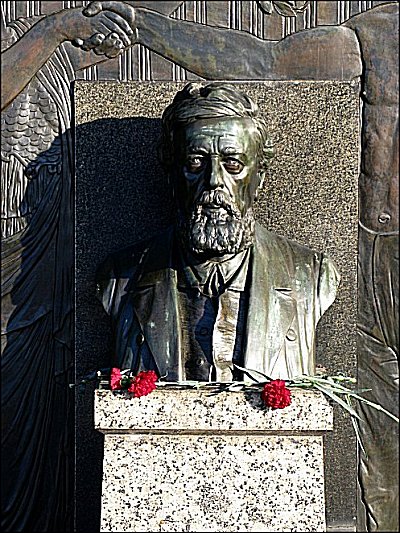
Denkmal Karl Liebknecht
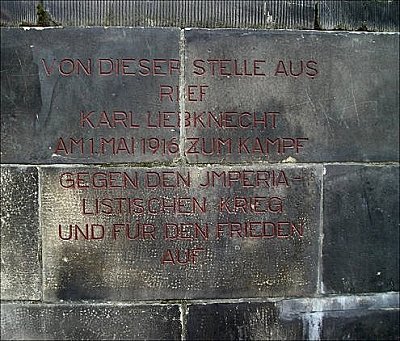
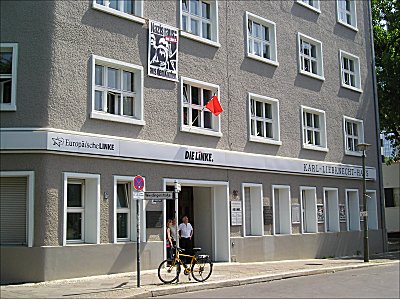
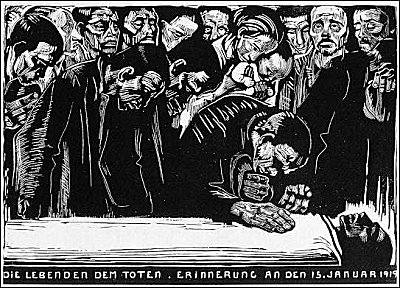
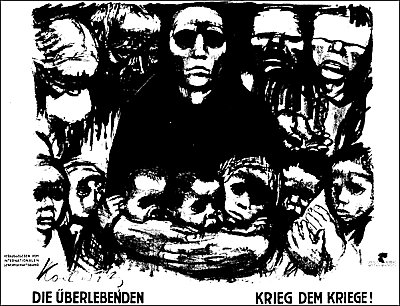
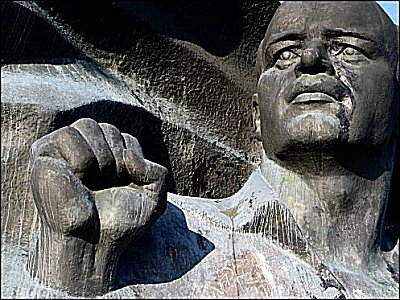
Denkmal Ernst Thalmann
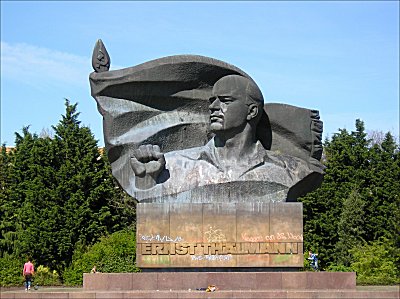
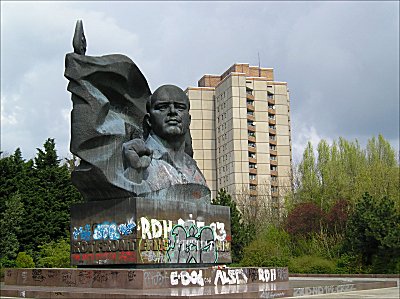

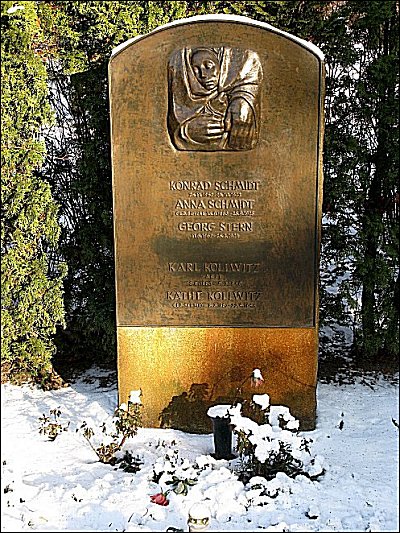
.jpg)
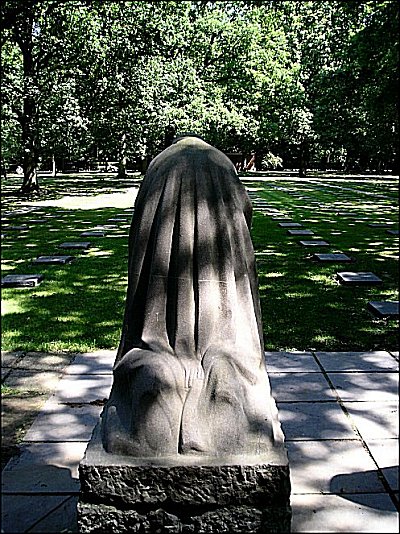

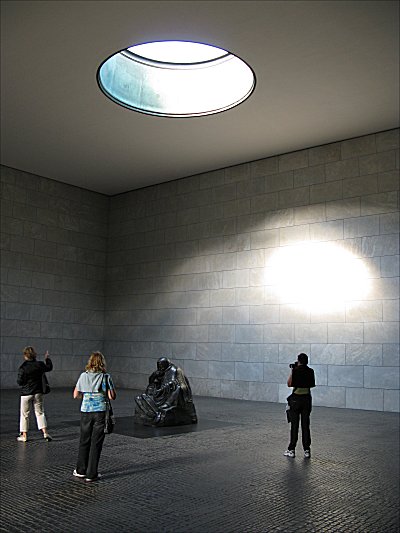
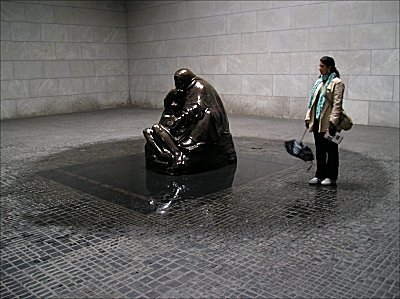

Käthe Kollwitz
Die Toten mahnen uns (II) Bilder
Photos: Anton K. Berlin
fleursdumal.nl magazine – magazine for art & literature
More in: *War Poetry Archive, Anton K. Photos & Observations, Käthe Kollwitz
.jpg)
K ä t h e K o l l w i t z
Die Toten Mahnen uns
Berlin
The street names still reflect old DDR times, before the demolishment of the wall in 1989. The Karl-Liebknecht-Straße runs alongside the Alexanderplatz and connects Prenzlauer Berg to the Museuminsel and Unter den Linden. At the Rosa-Luxembourg-Platz, a few hundred meters to the north, a monument to Herbert Baum and a memorial plaque to Ernst Thälmann commemorate the resistance of the communists against fascism and against the wars that overshadowed life in Europe during the first half of the 20th century. The rise of a working class who lived in miserable conditions dominated social discussions in the early 1900’s. In 1914 a complex combination of imperialism, militarism and strong nationalistic feelings led to the First World War which eventually involved 75 percent of the world’s population and took the lives of 20 million soldiers and civilians. After the war the political situation in Germany remained unstable. The Treaty of Versailles declared Germany responsible for the war, it redefined its territory and Germany was forced to pay enormous war reparations. This treaty caused great bitterness in Germany and was a source of inspiration for both left and right extremism. It eventually led to the rise of fascism and the Second World War. Karl Liebknecht and Rosa Luxembourg, founders of the Kommunistische Partei Deutschland (KPD), were killed in 1919 by Freikorpsen, right extremist remainders of the German army. Herbert Baum and his resistance group were killed by the Gestapo in 1942 and Ernst Thälmann, Hitlers political opponent during the elections of 1932, was executed in Buchenwald in August 1944, on direct orders from Hitler.
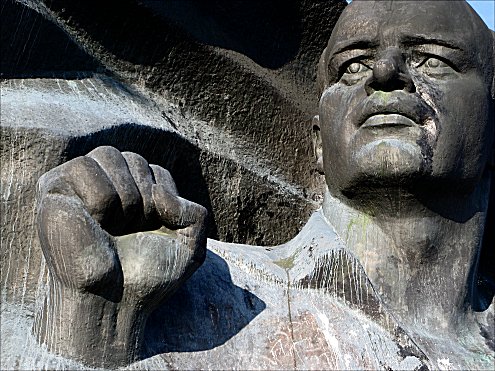
Käthe Kollwitz
Käthe Schmidt was born in Königsberg in 1867 in a family of social democrats that were sensitive to the changes that were taking place in society. Her talent for art was recognised and stimulated by her father. She received lessons in drawing in a private art school in Berlin. Under the influence of her teacher Stauffer-Bern and the work of Max Klinger she decided to focus on black and white drawing, etching and lithography. She married Karl Kollwitz, a friend of the family, in 1891. Karl had decided to dedicate his live to the poor working class and started a doctor’s practice in Prenzlauer Berg in a street that is now called the Käthe-Kollwitz-Straße. They had 2 sons, Hans and Peter. Käthe was deeply moved by the social misery she was confronted with in her husbands practice and the life of the working class became a dominant theme in her work. It was Gerhard Hauptman’s play ‘die Weber’ that inspired her to her first successful series of etchings called ‘Ein Weberaufstand’. Another successful series was ‘Bauernkrieg” for which she received the prestigious ‘Villa Romana’ price. At the age of 50 Käthe had become famous throughout Germany and to the occasion of her birthday, exhibitions of her work were held in Berlin, Bremen and Königsberg.
In October 1914 her son Peter was killed in the trenches of Flanders. To his memory Käthe designed a monument which took her almost 18 years to complete. In Diksmuide-Vladslo, in a landscape covered by hundreds of war cemeteries, her ‘Grieving Parents’ impressively expresses the poignant grief and helplessness of parents who have lost a child. The death of her son had a great impact on her work and war and death became the dominant themes. When Karl Liebknecht was killed in 1919 his family asked Käthe to make a drawing to his memory. In a charcoal drawing she depicts the worker’s farewell to Liebknecht. A final version in woodcut was made 2 years later. Sieben Holzschitte zur Krieg were made in 1920/1923 and her famous poster Nie Wieder Krieg, a consignment by the International Labours Union, in 1924. She was not the only artist that stood up against war but while the artistic protests of for instance George Grosz, Otto Dix or Frans Masereel were primarily aimed at the horrors of the battlefield or the political climate, Käthe Kollwitz’s concern was with the human suffering of those who were left behind.
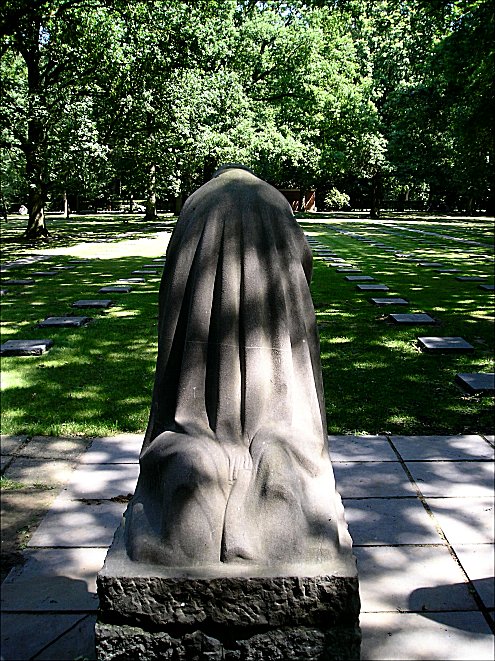
When the Nazis came to power in 1933, she and her husband signed an urgent appeal to unite the working class and to the formation of a front against Hitler. The SPD and KPD were forbidden by the Nazis and Käthe was removed from her position at the Berlin Art Academy where she was heading the Masterclass of Graphics. Exhibitions of her work were forbidden. Karl was also temporarily disallowed to exercise his practice and their financial situation became precarious until his ban was relieved due to a shortage of skilled physicians. Karl Kollwitz, after a life dedicated to the health of the poor, died in July 1940.
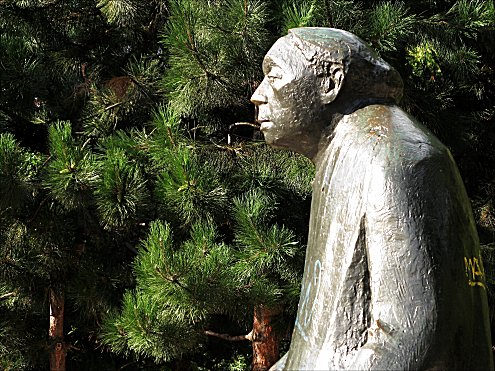
After Karl’s death Käthe suffered from depression and her physical condition was rapidly declining. The house in Berlin where she and Karl had been living since 1891 was bombed in 1943 and Käthe was evacuated to Nordhausen and later to Moritzburg. A few days before the end of the Second World War, in April 1945, Käthe Kollwitz died. She was buried in the family grave in Berlin-Friedrichsfelde at the same cemetery where a memorial monument pays tribute to the socialist heroes Karl Liebknecht, Rosa Luxembourg and Ernst Thälmann.
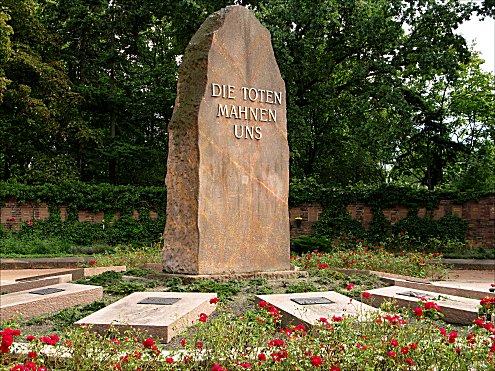
A mission
Käthe’s importance as an artist cannot be overvalued. Her authentic, expressive depictions of human misery, resulting from the exploitation of human labour, from fascism and war, are timeless, genuine and moving. She was not a politician but an artist with a vocation who found a way to make art that goes straight to the heart.
When you are in Berlin be sure to visit ‘Die Neue Wache’, a building designed by Christian Schinkel, which since the 1960-s is a monument against war and fascism. In the centre of the building, right beneath a circular opening in the ceiling, Käthe Kollwitz’s sculpture Mother and Child is an arresting plea for vigilance against mentalities and attitudes that may again lead to fascism and war.
References:
Ilse Kleberger: Kathe Kollwitz, Eine Biographie
Venues
Neue Wache – Unter den Linden near the Museuminsel
Kathe Kollwitzmuseum Berlin – Fasanenstrasse 24
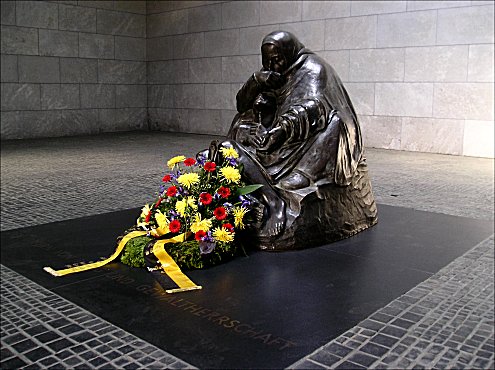
Käthe Kollwitz: Die Toten mahnen uns – part I
Photos & text: Anton K. Berlin
![]()
Find also on fleursdumal.nl magazine:
Nie Wieder: Wache gegen Faschismus
and
Historia Belgica: Alles voor Vlaanderen
![]()
fleursdumal.nl magazine – magazine for art & literature
to be continued
More in: *War Poetry Archive, Anton K. Photos & Observations, Fascism, Käthe Kollwitz, Sculpture
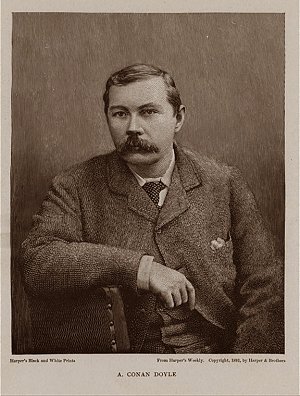
Arthur Conan Doyle
(1859-1930)
Haig is moving
August 1918
Haig is moving!
Three plain words are all that matter,
Mid the gossip and the chatter,
Hopes in speeches, fears in papers,
Pessimistic froth and vapours–
Haig is moving!
Haig is moving!
We can turn from German scheming,
From humanitarian dreaming,
From assertions, contradictions,
Twisted facts and solemn fictions–
Haig is moving!
Haig is moving!
All the weary idle phrases,
Empty blamings, empty praises,
Here’s an end to their recital,
There is only one thing vital–
Haig is moving!
Haig is moving!
He is moving, he is gaining,
And the whole hushed world is straining,
Straining, yearning, for the vision
Of the doom and the decision–
Haig is moving!
Arthur Conan Doyle poetry
kempis.nl poetry magazine
More in: *War Poetry Archive, Archive C-D, Arthur Conan Doyle, Doyle, Arthur Conan
Thank you for reading Fleurs du Mal - magazine for art & literature